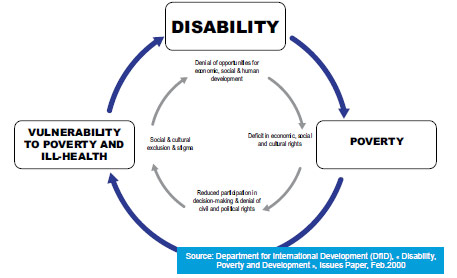 The project
The project
Promoting the rights of all individuals, especially those of persons with disabilities
The West African Regional Portal on the Rights and Inclusion of People with Disabilities (PROADIPH) aims to promote the rights of people with disabilities as well as access to information regarding these rights, in accordance with Article 21 of the United Nations Convention on the Rights of Persons with Disabilities (CRPD) relating to freedom of expression and opinion and access to information..
Human rights apply to all people in all their diversity, without discrimination. The dignity of all human beings must be respected, with equal respect for women and men. Whenever a person suffers an injury to his/her dignity, experiences discrimination, or is treated or considered as less than a whole person, this means his/her human rights have been violated. A person discriminated against or marginalized is deprived of the opportunities enjoyed by others. Today, this is still very much an issue in the daily lives of people with disabilities.
Disability is an aspect of human diversity, like gender, ethnicity and culture.
According to estimates commonly used by international bodies, people with disabilities comprise 15% of the world’s population, with 85% living in developing countries (WHO).
Fighting against poverty and vulnerability
The situation of people with disabilities is marked by serious socio-economic inequality when compared with the rest of the population:
![]() People with disabilities comprise one in five of the global population living below the poverty line. (World Bank).In developing countries, the majority of people with disabilities belong to the poorest social groups.
People with disabilities comprise one in five of the global population living below the poverty line. (World Bank).In developing countries, the majority of people with disabilities belong to the poorest social groups.
![]() 90% of disabled children do not attend school (UNESCO) and 30% of street children are disabled (UNICEF).
90% of disabled children do not attend school (UNESCO) and 30% of street children are disabled (UNICEF).
![]() Literacy rates among adults with disabilities do not exceed 3% for men and 1% for women (UNDP).
Literacy rates among adults with disabilities do not exceed 3% for men and 1% for women (UNDP).
![]() The unemployment rate for people with disabilities reaches 85% in some countries (ILO).
The unemployment rate for people with disabilities reaches 85% in some countries (ILO).
People with disabilities are also more vulnerable to all forms of violence, especially women and children. They are a particularly vulnerable group in conflict situation.
Disability can be understood as both a cause and a consequence of poverty. They aggravate each other and form a vicious cycle: disability generates poverty, and poverty generates disability.

Legend of figure :
The vicious circle of disability and poverty: disability can lead to poverty, and poverty can put individuals in situations of vulnerability to poverty and ill-health, which can eventually lead to disability. Within this circle, disability often causes a denial of opportunities for access to economic, social and human development, leading to a deficit in economic, social and cultural rights, to a reduced participation in decision-making and a denial of civil and political rights, causing social and cultural exclusion.
Source : Department for International Developement (DfID), Disability, Poverty and Development, Issues Paper, Feb. 2000
People living in poverty are exposed to increased risk of accidents and serious health problems, have difficult access to food, and their more critical living and working conditions can cause disabilities. Thus, underprivileged people are more exposed to disability risks.
Disability can lead to poverty because it is a barrier to participation in the social and economic life of their communities, particularly if support services and adaptation measures are not available. It is not the impairment itself which creates the vicious cycle between disability and poverty but discrimination, social exclusion and the denial of rights, coupled with limited access to basic services.
In West Africa, these different forms of discrimination and social and economic inequalities are very strong. These factors are even stronger for women because they suffer double discrimination based on their gender and their disability. Disability clearly limits access to education, employment, information, health services and other basic services. It also limits the participation of PWDs in society and in their communities and ultimately leads to the social, economic and civic exclusion of the most disadvantaged. The realization of their basic rights faces many challenges and constraints that are essentially the same throughout the sub-region. These specific constraints are as follows:
![]() The widespread ignorance of their rights;
The widespread ignorance of their rights;
![]() The lack of information, quantitative/qualitative data and good practices, making the promotion of disability rights more difficult.
The lack of information, quantitative/qualitative data and good practices, making the promotion of disability rights more difficult.
The main objective of the PROADIPH portal is to make information more available and accessible to all and thus contribute to a better integration of people with disabilities in their communities.
The information available online is first and foremost intended for people with disabilities and disability organizations, but also more generally to the public, development partners and policy makers.













